Introduction
In the world of digital marketing, the choice between Affinity vs HubSpot can significantly impact your business’s success. Both platforms offer unique features tailored to different needs, but understanding their core differences is crucial for making an informed decision. Whether you’re focused on relationship management or seeking a comprehensive marketing solution, this blog post will guide you through the key aspects of each tool, helping you determine which one is the best fit for your content creation and marketing strategy.

Table of Contents
What is Affinity?
Affinity is a relationship management tool designed to enhance collaboration and streamline workflows. It focuses on helping businesses manage their relationships with clients and prospects more effectively. Affinity integrates various features, such as:
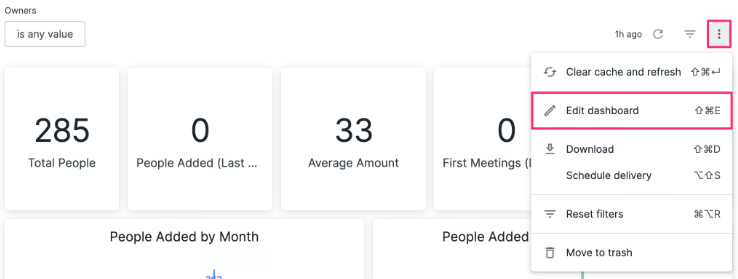
- Data Management: Automatically aggregates data from various sources, creating a comprehensive view of your relationships.
- Insights and Analytics: Provides actionable insights to help you understand your network better.
- Collaboration Tools: Facilitates teamwork through shared notes and communications.
What is HubSpot?
HubSpot is an all-in-one marketing, sales, and customer service platform. It offers a wide range of tools designed to support businesses in their growth journey. Key features of HubSpot include:
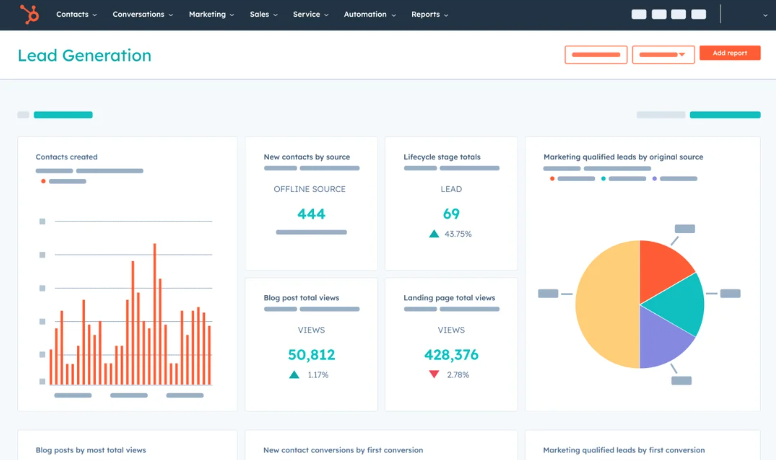
- Content Management System (CMS): Build and manage your website with ease.
- Email Marketing: Create targeted email campaigns to engage your audience.
- CRM Integration: Manage customer relationships seamlessly.
- Analytics and Reporting: Monitor the performance of your campaigns in real-time.
Affinity vs HubSpot: Key Differences
Understanding the differences between Affinity and HubSpot is crucial when choosing the right tool for your business. Here are some key areas to consider:
1. Target Audience
- Affinity: Primarily targets businesses looking to enhance their relationship management. It is particularly useful for B2B companies that rely on networking and relationship-building.
- HubSpot: Aims at a broader audience, including B2C and B2B companies. HubSpot is designed for businesses that want a comprehensive solution for marketing, sales, and customer service.
2. Features and Functionality
- Affinity: Focuses on relationship management, offering features that help businesses manage contacts and relationships more effectively. Its strengths lie in data aggregation and insights.
- HubSpot: Provides a wide array of marketing tools, from SEO optimization to social media management. HubSpot’s functionality extends beyond relationship management, making it a more versatile choice for marketing.
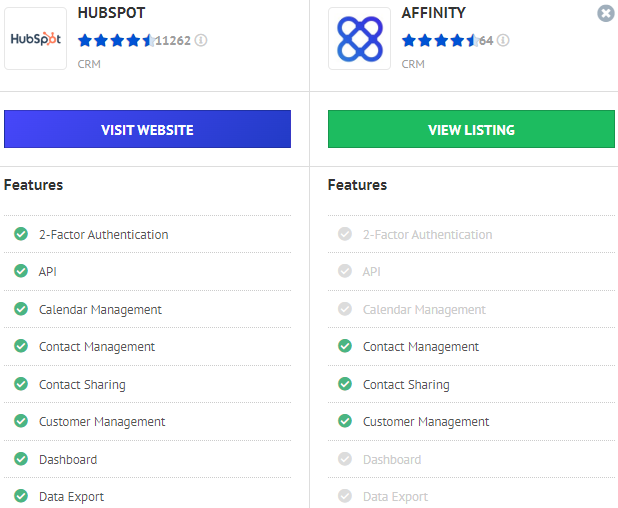
3. Ease of Use
- Affinity: Known for its user-friendly interface, Affinity simplifies relationship management. However, it may lack some advanced features that marketers require.
- HubSpot: Offers a robust set of features, but the learning curve can be steeper for new users. However, once familiar, users often find HubSpot to be highly intuitive.
4. Pricing Structure
- Affinity: Typically operates on a subscription model, but pricing can vary based on the features chosen. It can be cost-effective for businesses focused on relationship management.
- HubSpot: Offers a freemium model with a range of pricing tiers. While the basic features are free, businesses may need to invest significantly to access advanced tools.
When to Choose Affinity
Affinity is a solid choice if your business relies heavily on building and managing relationships. Here are some scenarios where Affinity shines:
- B2B Networking: If your business thrives on connections and partnerships, Affinity’s relationship management features will be beneficial.
- Data-Driven Insights: For businesses that rely on data to make informed decisions, Affinity’s analytics can provide valuable insights.
- Collaboration Needs: If your team frequently collaborates on relationship management, Affinity’s collaborative tools can enhance teamwork.
When to Choose HubSpot
HubSpot is a versatile tool suitable for a variety of marketing and sales needs. Consider HubSpot if:
- Comprehensive Marketing Strategy: If your business requires a full suite of marketing tools, HubSpot offers everything from content creation to SEO.
- Scalability: For businesses looking to scale quickly, HubSpot’s advanced features and CRM capabilities can support your growth.
- Integrated Solutions: If you prefer an all-in-one solution for marketing, sales, and customer service, HubSpot is a more fitting choice.
Integration Capabilities
Affinity
Affinity excels in integrating with a variety of platforms to enhance its functionality and provide a seamless user experience. Some of the most popular integrations include:
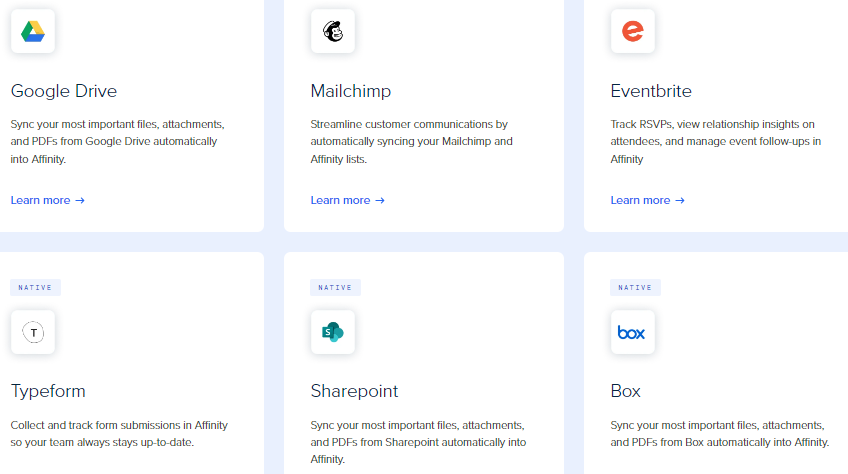
- CRM Systems: Affinity allows you to sync data with widely-used CRM platforms, such as Salesforce or Zoho. This integration streamlines relationship management by ensuring that all relevant contact information, communication history, and insights are easily accessible in one place, facilitating better collaboration and follow-ups.
- Email Platforms: Affinity integrates with various email services like Gmail and Outlook, enhancing communication efforts. This integration enables users to manage their emails directly within Affinity, allowing for easier tracking of conversations and a more organized approach to client interactions.
HubSpot
HubSpot offers extensive integration capabilities, empowering users to connect with numerous platforms and tools essential for effective marketing and sales. Key integrations include:

- Social Media: HubSpot allows users to seamlessly manage their social media accounts, including Facebook, Twitter, LinkedIn, and Instagram, all from a single dashboard. This integration enables you to schedule posts, monitor engagement, and analyze performance, making it easier to execute and refine your social media strategy.
- E-commerce Platforms: HubSpot can be connected to popular e-commerce solutions like Shopify and WooCommerce. This integration provides valuable insights into customer behavior and purchase patterns, allowing you to create targeted marketing campaigns and optimize your online store for better sales performance.
User Support and Resources
Affinity
Affinity is dedicated to providing robust user support to ensure that its clients can effectively utilize the platform. Key support resources include:
- Documentation: Affinity offers comprehensive guides and documentation designed to help users navigate the platform’s features and functionalities. These resources cover everything from initial setup to advanced usage tips, allowing users to find solutions quickly and maximize their experience. The documentation is regularly updated to reflect any new features or changes, ensuring that users always have access to the most relevant information.
- Customer Support: Affinity boasts a responsive customer support team that is readily available to assist users with any issues they may encounter. Users can reach out via various channels, including email and chat support, ensuring that they receive timely assistance. This commitment to customer care helps users resolve challenges efficiently, minimizing downtime and enhancing their overall satisfaction with the platform.
HubSpot
HubSpot excels in user support, offering a wealth of resources to empower users and help them get the most out of the platform:
- HubSpot Academy: One of HubSpot’s standout features is its HubSpot Academy, which provides a variety of free courses and certifications. These resources cover a wide range of topics, including inbound marketing, sales strategies, and content creation. By taking advantage of these courses, users can deepen their understanding of the platform, enhance their marketing skills, and implement best practices that drive results. The certifications are recognized in the industry, adding value to users’ professional credentials.
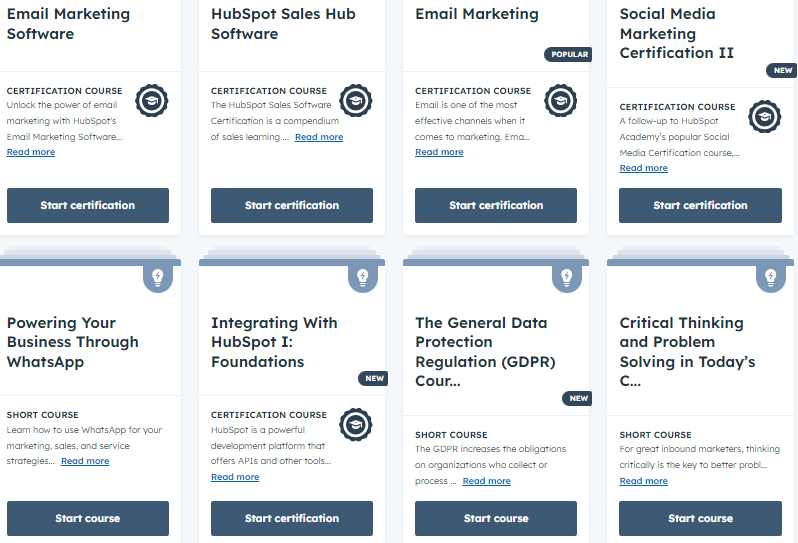
- Community Forums: HubSpot hosts a vibrant community of users who actively engage in forums to share tips, ask questions, and provide insights. This community-driven support system allows users to connect with peers, exchange ideas, and troubleshoot common issues together. The forums are an invaluable resource for users looking to learn from others’ experiences and gather diverse perspectives on using HubSpot effectively.
Final Thoughts: Affinity vs HubSpot
Choosing between Affinity and HubSpot ultimately depends on your business needs. If relationship management is your primary focus, Affinity offers specialized features that cater to that niche. However, if you seek a comprehensive marketing solution that covers various aspects of business growth, HubSpot is likely the better choice.
Before making a decision, consider the following:
- Assess your primary goals: Are you focused on relationship management or broader marketing strategies?
- Evaluate your budget: Which platform offers the best value for your specific needs?
- Test the platforms: Utilize free trials to get a hands-on feel for each tool.
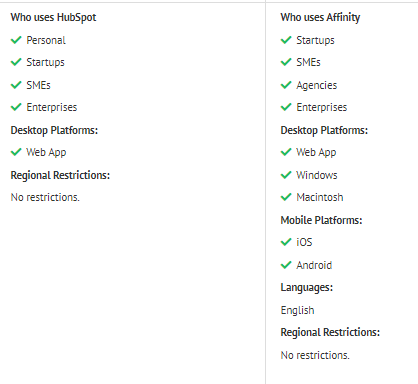
Conclusion
In the debate of Affinity vs HubSpot, the right choice hinges on your specific business needs and goals. Affinity excels in relationship management, making it ideal for B2B companies focused on networking and insights. Conversely, HubSpot offers a comprehensive suite of marketing tools suitable for a wider range of businesses, from startups to established enterprises.
Before making a decision, consider your marketing objectives, budget, and the importance of integrated solutions. Both platforms provide unique features that can enhance your marketing strategy, so take advantage of their free trials to find the best fit for your team.
For more information, check out HubSpot and Affinity to explore their offerings further and see how they can help elevate your marketing efforts.





